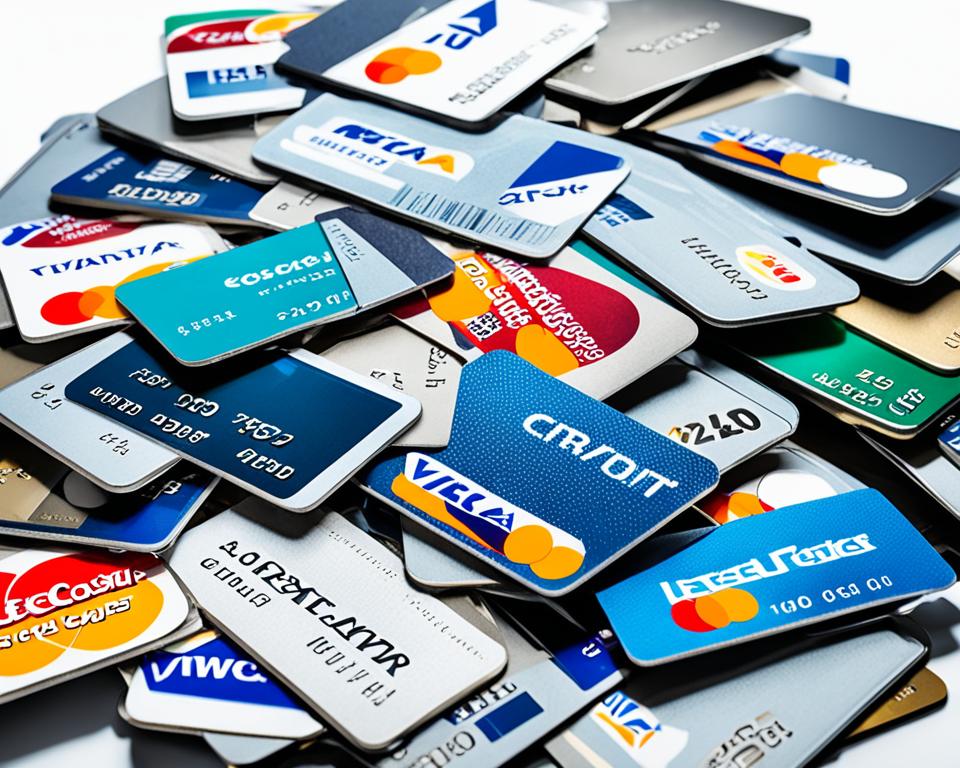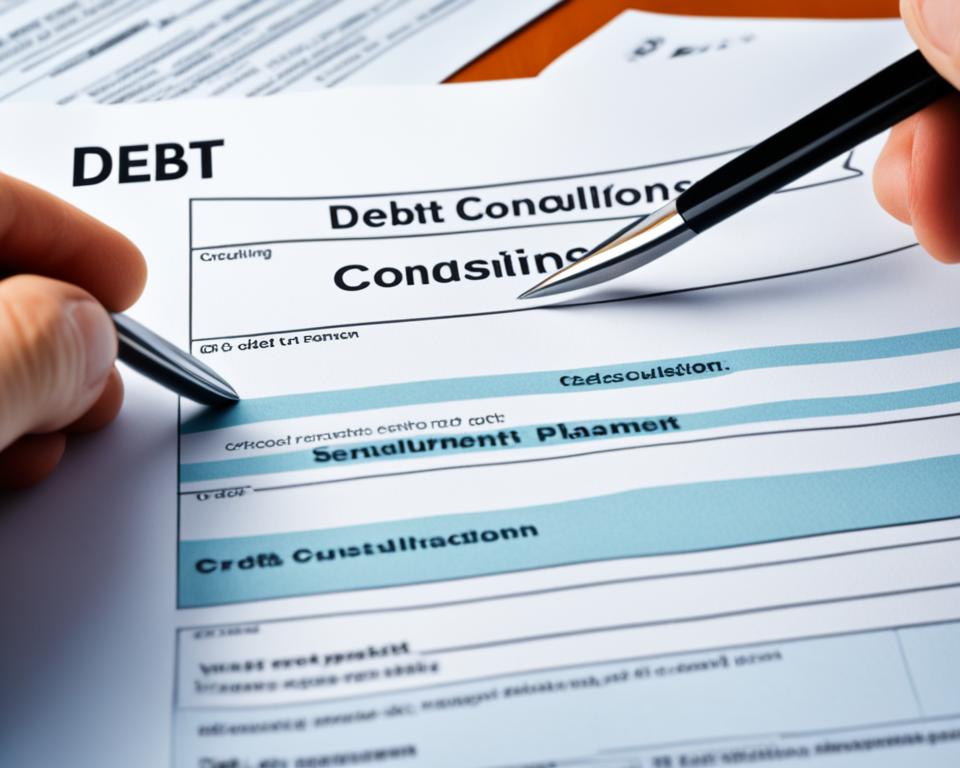Credit card debt is a common issue in the United States, with the majority of Americans having at least one credit card. Many individuals find themselves struggling to make credit card payments and wonder if their debt can be forgiven.
While there is no government-sponsored program for credit card debt relief, credit card debt forgiveness does exist through negotiation and settlement with lenders. Through careful consideration of debt relief options, individuals may find relief from their credit card debt burden.
Key Takeaways:
- Credit card debt can be forgiven through negotiation and settlement with lenders.
- There is no government-sponsored program for credit card debt forgiveness.
- Debt relief options such as debt settlement and bankruptcy can provide relief from credit card debt.
- It is important to carefully evaluate options and consider the financial implications of credit card debt forgiveness.
- Tax implications may arise from forgiven credit card debt, and consulting with a tax professional is advisable.
Who Qualifies for Credit Card Debt Forgiveness?
While there is no specific government program for credit card debt forgiveness, individuals can still qualify for forgiveness through negotiations with their lenders. Almost anyone who struggles with making their credit card payments may be eligible for debt forgiveness. However, it is important to understand the available options and determine eligibility based on individual circumstances.
“Credit card debt forgiveness provides relief for those who find it challenging to repay their debts. By negotiating with lenders, individuals can potentially settle their debts for a reduced amount, offering an opportunity to regain financial stability.”
To determine eligibility for credit card debt forgiveness, individuals should consider the following qualifications:
- Financial hardship: Individuals facing financial difficulties and struggling to meet credit card payments may qualify for debt forgiveness.
- Delinquent accounts: Accounts that are severely delinquent or in default are more likely to qualify for debt forgiveness.
- Debt-to-income ratio: Lenders may consider an individual’s debt-to-income ratio when evaluating eligibility for debt forgiveness.
- Ability to negotiate: Effective negotiation skills can significantly increase the chances of qualifying for debt forgiveness.
It’s important to note that credit card debt forgiveness is not guaranteed and varies on a case-by-case basis. Lenders have their own criteria and processes for evaluating forgiveness eligibility. Therefore, individuals should explore various debt relief options, such as debt settlement programs, to increase their chances of qualifying for credit card debt forgiveness.
One way to better understand the eligibility criteria and processes for credit card debt forgiveness is to consult with a financial advisor or a reputable debt relief organization. These professionals can provide guidance and support when navigating the complexities of debt forgiveness.
Benefits of Credit Card Debt Forgiveness
Credit card debt forgiveness offers several benefits to individuals who qualify:
- Reduced debt burden: Debt forgiveness can significantly reduce the outstanding debt amount, making it more manageable to repay.
- Improved financial situation: By eliminating or reducing credit card debt, individuals can experience improved financial stability and reduce the stress associated with debt.
- Opportunity for a fresh start: Credit card debt forgiveness provides individuals with an opportunity to start anew and rebuild their financial health.
| Debt Relief Option | Qualifications | Benefits |
|---|---|---|
| Debt Settlement Programs | – Financial hardship – Delinquent accounts – Ability to negotiate |
– Reduced debt burden – Improved financial situation |
| Bankruptcy | – Financial hardship – Overwhelming debt |
– Complete debt forgiveness – Fresh start |
| Debt Consolidation | – Ability to obtain a consolidation loan – Manageable debt-to-income ratio |
– Simplified repayment plan – Lower interest rate |
| Financial Hardship Programs | – Demonstrated financial difficulty – Communication with credit card companies |
– Lower interest rates – Fixed payment terms |
How to Get Your Credit Card Debt Forgiven
When facing overwhelming credit card debt, finding a way to get it forgiven can provide much-needed relief. While credit card debt forgiveness is not guaranteed, there are several options available to explore. Understanding these options and their potential benefits can help individuals make informed decisions about their financial future.
Debt Settlement Programs
One option for credit card debt forgiveness is through debt settlement programs. These programs work by creating a structured repayment plan and negotiating with creditors to potentially reduce the amount owed. By working with a debt settlement company, individuals can benefit from their expertise in negotiations and potentially save a significant amount of money.
Bankruptcy
In cases where debt settlement programs may not be a viable option, bankruptcy can be considered as a last resort. Filing for bankruptcy can provide individuals with a fresh start by eliminating or restructuring their debts. However, it is important to note that bankruptcy has long-term financial implications and should be carefully considered.
Debt Consolidation Loans
Debt consolidation loans can also help individuals get their credit card debt forgiven. These loans allow individuals to combine multiple debts into one loan with a lower interest rate. By consolidating their debts, individuals can simplify their payments and potentially pay off their debt sooner.
Financial Hardship Programs
Many credit card companies offer financial hardship programs for individuals struggling with credit card debt. These programs often involve lower interest rates and more manageable payment terms. Contacting credit card companies and exploring their financial hardship programs can provide individuals with an opportunity to get their credit card debt forgiven.
| Debt Relief Option | Advantages | Considerations |
|---|---|---|
| Debt Settlement Programs | – Potential reduction of amount owed – Structured repayment plan |
– Impact on credit score – Debt settlement fees |
| Bankruptcy | – Fresh start – Potential debt elimination |
– Long-term financial implications – Impact on credit score |
| Debt Consolidation Loans | – Lower interest rate – Simplified payments |
– Eligibility requirements – Potential for additional debt |
| Financial Hardship Programs | – Lower interest rates – More manageable payment terms |
– Impact on credit score – Limited availability |
It’s important to remember that credit card debt forgiveness is not an easy process and may not always be feasible. Each option has its advantages and considerations, so it’s crucial to carefully evaluate individual financial circumstances and goals. Seeking professional advice from a financial advisor or credit counselor can also provide valuable insights and guidance in the debt forgiveness journey.

Debt Settlement Programs for Credit Card Debt Forgiveness
Debt settlement programs offer individuals struggling with credit card debt an effective debt relief service. These programs involve working with a debt relief expert who will analyze your debts and financial position to create a personalized payment plan. Through negotiations with creditors, the goal is to potentially reduce the balance owed, making it more manageable for you to achieve debt forgiveness.
Here is how debt settlement programs work:
- Analyze your debts: A debt relief expert will review your credit card debts and assess your financial situation.
- Create a payment plan: Based on your available resources, a customized payment plan will be developed to help you pay off your debts.
- Save money in a special-purpose savings account: Instead of making payments to your creditors, you will save money in a dedicated account while negotiations take place.
- Negotiate with creditors: The debt settlement company will negotiate with your creditors to potentially reduce the balance owed, often by a significant amount.
- Achieve debt forgiveness: If successful, the negotiated settlement amount will be used to pay off your debt, resulting in debt forgiveness for the remaining balance.
Please note: While debt settlement programs can be a viable option for credit card debt relief, it is important to consider the potential disadvantages. Debt settlement can have a negative impact on your credit score and may result in larger debt burdens or income taxes on forgiven debt. It is crucial to weigh the benefits and drawbacks before committing to a debt settlement program.
Pros and Cons of Debt Settlement Programs
| Pros | Cons |
|---|---|
| Reduces the total debt amount | Negative impact on credit score |
| Offers debt forgiveness for the remaining balance | Possible larger debt burdens |
| Provides a structured payment plan | Potential income taxes on forgiven debt |
Bankruptcy as a Solution for Credit Card Debt Forgiveness
If credit card debt settlement does not provide enough relief, filing for bankruptcy may be necessary. Bankruptcy can offer individuals a chance to wipe the slate clean and start fresh in their financial journey. However, it’s important to understand the consequences and potential trade-offs that come with filing for bankruptcy.
Understanding Bankruptcy
Bankruptcy is a legal process designed to help individuals and businesses who are unable to pay their debts. It provides debtors with the opportunity to have their debts forgiven or restructured under the supervision of a bankruptcy court. There are different types of bankruptcy, including Chapter 7 and Chapter 13, each with its own eligibility requirements and consequences.
Benefits of Bankruptcy for Credit Card Debt
One of the main benefits of filing for bankruptcy is the potential to have credit card debt completely forgiven. This can provide individuals with a clean financial slate, freeing them from the burden of overwhelming debt. Bankruptcy can also put an immediate stop to collection efforts, including lawsuits, wage garnishments, and harassing phone calls from creditors.
Considerations and Consequences
Before filing for bankruptcy, it’s important to consider the potential consequences. One significant consequence is the impact on credit scores, as bankruptcy can remain on an individual’s credit report for up to 10 years. This can make it challenging to access credit in the future and may result in higher interest rates when borrowing. Additionally, some assets may need to be liquidated to repay creditors, depending on the type of bankruptcy filed.
“Bankruptcy can provide individuals with a fresh start, but it’s crucial to explore all other options and understand the long-term implications.”
Individuals considering bankruptcy as a solution for credit card debt should also be aware of the potential requirement for credit counseling and financial education courses. These courses aim to equip individuals with the tools and knowledge to effectively manage their finances in the future.
Consulting with a Bankruptcy Attorney
Bankruptcy laws can be complex, and it’s essential to consult with a bankruptcy attorney who specializes in helping individuals navigate this process. An experienced attorney can provide guidance and ensure that individuals understand their rights, obligations, and the best course of action based on their unique financial situation.
If bankruptcy is the chosen path, it’s crucial to gather all the necessary financial documentation, including credit card statements, income records, and asset information, to present a complete and accurate picture to the bankruptcy court.
Other Options for Credit Card Debt Relief
In addition to debt settlement and bankruptcy, there are other effective options for individuals seeking credit card debt relief. These options provide alternative paths to financial stability and can be tailored to individual circumstances.
Debt Consolidation Loan
A debt consolidation loan is a popular choice for those looking to simplify their debt payments. This option allows individuals to consolidate multiple credit card debts into a single loan, often at a lower interest rate. By consolidating debts, individuals can benefit from a clear payment schedule and potentially save money on interest charges. It’s a practical solution to manage credit card debt more efficiently.
Home Equity
Homeowners can consider leveraging their home equity as a means of consolidating credit card debts. By taking out a home equity loan or line of credit, individuals can use the equity in their homes to pay off high-interest credit card balances. This option typically offers lower interest rates and extended repayment terms, providing homeowners with a viable strategy to manage and reduce their credit card debt.
Debt Consolidation Programs
Credit card companies often offer debt consolidation programs that provide relief through better terms and lower interest rates. These programs allow individuals to consolidate their credit card balances with the issuing company itself, simplifying payments and potentially reducing the overall debt burden. Participating in a debt consolidation program can offer a more manageable approach to credit card debt repayment.
Financial Hardship Programs
Many credit card companies have financial hardship programs in place to assist customers facing economic challenges. These programs provide relief by offering lower interest rates and fixed payment terms to individuals experiencing financial difficulties. By reaching out to their credit card issuer and participating in a financial hardship program, individuals can alleviate the stress associated with credit card debt and work towards a more stable financial future.
Overall, these alternative options for credit card debt relief provide individuals with the opportunity to regain control over their finances and pave the way towards a debt-free future. Whether through a debt consolidation loan, leveraging home equity, enrolling in debt consolidation programs, or exploring financial hardship programs, there are viable solutions available for those seeking relief from credit card debt.

| Option | Description |
|---|---|
| Debt Consolidation Loan | A personal loan used to consolidate credit card debts at a lower interest rate with a clear payment schedule. |
| Home Equity | Utilizing the equity in a home to consolidate credit card debts, often resulting in lower interest rates and extended repayment terms. |
| Debt Consolidation Programs | Credit card company programs that allow individuals to consolidate credit card balances with better terms and lower interest rates. |
| Financial Hardship Programs | Programs offered by credit card companies to provide relief through lower interest rates and fixed payment terms for individuals facing financial difficulties. |
Working with Credit Card Companies for Debt Relief
When facing overwhelming credit card debt, it is possible to seek debt relief by working directly with your credit card companies. By engaging in open communication and exploring available options, you can negotiate a plan that provides financial relief and helps you regain control of your finances.
Payment Plan Negotiation
One option to consider is negotiating a payment plan with your credit card issuer. This involves contacting the credit card company, explaining your financial hardships, and proposing a plan that allows you to make affordable monthly payments while gradually reducing your outstanding debt.
Working out a payment plan can provide you with immediate relief by establishing a structured repayment schedule. By adhering to the agreed-upon terms, you can make consistent progress in paying off your debt without facing excessive financial strain.
The Credit Card Hardship Plan
Another avenue to explore is the credit card hardship plan offered by many credit card issuers. This program is designed to provide financial relief to customers facing challenging circumstances, such as job loss, medical expenses, or other unexpected financial burdens.
The credit card hardship plan typically offers relief by reducing the interest rate on your credit card debt, making monthly payments more manageable. This can significantly lower the overall amount you need to repay and provide you with the opportunity to regain your financial stability.
The Impact on Your Credit Score
While negotiating debt relief directly with your credit card companies can be a valuable step toward financial recovery, it is essential to consider the potential impact on your credit score. Participating in payment plans or credit card hardship programs may be reported to credit bureaus and could temporarily impact your credit score. However, consistently making payments as agreed upon can ultimately help improve your credit standing in the long run.
It is crucial to have an open dialogue with your credit card issuer, express your willingness to repay your debt, and discuss the available options that can provide you with the necessary financial relief. By working together, you can find a solution that aligns with your current circumstances and sets you on the path to a brighter financial future.
Debt Management Plans for Credit Card Debt Relief
When facing credit card debt, individuals can turn to debt management plans offered by credit counseling organizations for assistance. These plans provide a structured approach to debt repayment by negotiating with creditors for lower fees and interest rates.
A debt management plan allows individuals to consolidate their credit card debts into a single monthly payment, making it easier to manage their financial obligations. The primary goal of these plans is to help individuals repay their debts in full over a specified period of time.
By working with a credit counseling organization, individuals can benefit from their expertise in negotiating with creditors on their behalf. These organizations have established relationships with credit card companies, which can lead to lower interest rates and waived fees.
However, it is important to note that debt management plans have certain limitations. For instance, they may not cover other types of debt, such as installment loans or mortgage payments. Additionally, participating in a debt management plan may require individuals to close their credit cards, which can impact their credit utilization ratio and credit scores.
Despite these limitations, debt management plans can provide a viable solution for individuals struggling with credit card debt. They offer the opportunity to repay debts at a lower interest rate and work towards financial stability. It is essential to carefully evaluate the terms and conditions of the plan and consider the potential impact on credit scores before enrolling.
Consider the following benefits and considerations of debt management plans:
- Lower interest rates and fees negotiated with creditors
- Simplified debt repayment through a single monthly payment
- Opportunity to repay debts in full within a specified timeframe
- Established relationships between credit counseling organizations and credit card companies
- Limitations in coverage for other types of debt
- Possible requirement to close credit cards
- Impact on credit utilization ratio and credit scores
Debt management plans can be a valuable tool for individuals seeking relief from credit card debt. By carefully assessing their financial situation and consulting with credit counseling organizations, individuals can determine if a debt management plan is the right solution for their needs.

Debt Settlement Companies for Credit Card Debt Relief
When it comes to credit card debt relief, debt settlement companies can play a crucial role in helping individuals reduce their debt burden. These companies specialize in negotiating with creditors on behalf of their clients to reach a lower settlement amount. This involves offering a lump-sum payment to settle the debt for less than what is actually owed.
While debt settlement can be an effective solution, it is important to note that it is typically viewed as a last resort before considering bankruptcy. It is also crucial to understand that debt settlement can have long-term negative impacts on credit scores. Therefore, it is essential to carefully consider the consequences before proceeding with this option.
It is also worth mentioning that the success of debt settlement negotiations is not guaranteed. However, experienced debt settlement companies have established relationships with creditors and possess the necessary negotiation skills to maximize the chances of reaching a favorable settlement.
Debt Settlement Fees
Debt settlement companies provide their services for a fee. These fees can vary depending on the company and the specific circumstances involved. It is important to thoroughly review and understand the fee structure before engaging the services of a debt settlement company. Clients should be aware that debt settlement fees are separate from the actual settlement amount and will be an additional financial obligation.
Understanding the fees associated with debt settlement is vital in order to make an informed decision and assess the overall cost of pursuing this debt relief option.
| Advantages | Considerations |
|---|---|
| • Potential reduction of the overall debt amount | • Last resort before considering bankruptcy |
| • Expert negotiation skills to reach favorable settlements | • Long-term negative impact on credit scores |
| • Established relationships with creditors | • No guarantee of successful negotiations |
| • Separate debt settlement fees |
Debt settlement companies are a viable option for individuals seeking credit card debt relief. However, it is crucial to carefully weigh the advantages and considerations, taking into account the potential long-term impact on credit scores and the associated debt settlement fees. Ultimately, consulting with a financial advisor or a debt settlement expert can provide valuable guidance in making the right decision based on individual circumstances.
Credit Card Debt Consolidation for Relief
One effective strategy for managing credit card debt is through credit card debt consolidation. This approach involves taking out a personal loan to consolidate multiple credit card debts into one single loan. By doing so, individuals can benefit from a lower interest rate, which can significantly reduce the overall cost of debt repayment.
With credit card debt consolidation, borrowers can enjoy the convenience of a fixed payment schedule. This means that they no longer have to worry about fluctuating monthly payments or juggling multiple due dates. Instead, they can focus on a single payment each month, simplifying their financial obligations and making it easier to stay on track.
By consolidating credit card debt, individuals can create a clear path to debt payoff. With a structured repayment plan in place, they can see the light at the end of the tunnel, knowing exactly when they will be debt-free. This sense of clarity and control can bring peace of mind and motivation to stay committed to the repayment process.
Benefits of Credit Card Debt Consolidation
There are several key benefits to consider when opting for credit card debt consolidation:
- Lowers interest rate: With a lower interest rate on a consolidated loan, individuals can save money on the overall cost of their debt.
- Streamlines payments: Consolidating credit card debt simplifies the payment process by combining multiple debts into one single monthly payment.
- Reduces financial stress: By having a fixed repayment schedule, individuals can better manage their finances and alleviate the stress associated with credit card debt.
Is Credit Card Debt Consolidation Right for You?
Credit card debt consolidation may be an ideal solution for individuals facing high-interest credit card debt and struggling to keep up with multiple payments. However, it’s important to consider eligibility and determine if it aligns with individual financial situations.
Before pursuing credit card debt consolidation, individuals should assess their credit score, income stability, and ability to qualify for a lower interest rate loan. It may be beneficial to consult with a financial advisor or credit counselor to evaluate the best options and determine if credit card debt consolidation is the most suitable choice.
Remember, credit card debt consolidation is not a one-size-fits-all solution, and it’s essential to carefully evaluate personal circumstances and financial goals before making a decision.
Financial Hardship Programs for Credit Card Debt Relief
Many credit card companies understand that individuals may encounter financial challenges and struggle to make their credit card payments. In response, these companies offer financial hardship programs to provide relief and support during difficult times. By participating in these programs, cardholders can benefit from lower interest rates and fixed payment terms, making their credit card payments more manageable.
To access financial hardship programs, all individuals need to do is contact their credit card companies and inquire about the available options. The process is simple and straightforward, with representatives ready to assist and guide cardholders through the application process. These programs are designed to help individuals regain their financial stability and avoid falling deeper into debt.
By enrolling in a financial hardship program, cardholders can enjoy lower interest rates on their credit card debt. This means that less money will go towards interest charges, allowing more of each payment to be applied towards the principal balance. With a reduced interest rate, individuals can make progress on their debt repayment more quickly.
Additionally, financial hardship programs often offer fixed payment terms. This means that cardholders will have a clear payment schedule and know exactly how much they need to pay each month. With predictable payments, individuals can better plan their budget and manage their finances effectively.
Exploring financial hardship programs can be a viable option for individuals struggling with credit card debt. These programs provide practical solutions to help cardholders overcome financial challenges and achieve their goal of becoming debt-free.
Benefits of Financial Hardship Programs:
- Lower interest rates on credit card debt
- Fixed payment terms for predictable budgeting
- Assistance and guidance from credit card company representatives
- Opportunity to regain financial stability
Cardholders facing financial difficulties should consider reaching out to their credit card companies and inquiring about available financial hardship programs. By taking this proactive step, individuals can start their journey towards credit card debt relief and a brighter financial future.
Considerations for Credit Card Debt Forgiveness
When faced with credit card debt, it is crucial to carefully consider the available options for debt relief and weigh the financial implications. The various debt relief options, such as debt settlement, bankruptcy, debt consolidation, and financial hardship programs, each have their advantages and disadvantages. Making an informed decision can help individuals effectively address their credit card debt while minimizing negative consequences and working towards long-term financial stability.
Evaluating Debt Settlement
Debt settlement programs can provide a viable option for credit card debt forgiveness. By working with a debt relief expert, individuals can negotiate with creditors to potentially reduce the amount owed. However, it is important to note that participating in debt settlement programs may have financial implications.
Firstly, debt settlement can have a significant impact on credit scores as it involves negotiating a reduced payment rather than full repayment. This can impact future borrowing opportunities and financial stability. Additionally, settling the debt for less than the full amount may result in tax obligations as the forgiven debt is considered taxable income.
Furthermore, while debt settlement allows for debt reduction, it is essential to consider the potential long-term implications. Debt settlement may result in larger debt burdens or income taxes on forgiven debt, which can impact financial stability and future goals.
Exploring Bankruptcy as a Last Resort
Bankruptcy is another option individuals may consider when facing overwhelming credit card debt. Filing for bankruptcy provides a fresh start and the opportunity for complete debt forgiveness. However, it is crucial to understand the consequences associated with this option.
Filing for bankruptcy can have a severe impact on credit scores and may require individuals to sell possessions to cover debts. It is a last resort option and should only be pursued after exploring other avenues for debt relief.
Considering Debt Consolidation
Debt consolidation is a strategy that involves combining multiple credit card debts into a single loan with lower interest rates and fixed payment schedules. It can provide individuals with the opportunity to streamline their debt repayment, making it more manageable and reducing the likelihood of missed payments.
However, debt consolidation may not be suitable for everyone. It is important to carefully evaluate the terms and conditions of the new loan, ensuring that it provides a viable solution for long-term debt repayment. Additionally, individuals need to consider their eligibility for debt consolidation and determine if this option aligns with their financial goals and circumstances.
Assessing Financial Hardship Programs
Many credit card companies offer financial hardship programs to assist individuals in managing their credit card debt. These programs often provide relief through lower interest rates and fixed payment terms, making it easier to meet monthly obligations.
Exploring financial hardship programs can be a valuable step in finding the right solution for credit card debt forgiveness. It is important to contact credit card companies directly and inquire about available programs to determine eligibility and understand the specific terms and conditions.
Debt Relief Options Comparison
| Debt Relief Option | Advantages | Disadvantages |
|---|---|---|
| Debt Settlement | Opportunity for debt reduction | Negative impact on credit scores, potential tax obligations |
| Bankruptcy | Potential for complete debt forgiveness | Severe impact on credit scores, may require selling possessions |
| Debt Consolidation | Streamlined repayment with lower interest rates | Terms and eligibility requirements must be carefully evaluated |
| Financial Hardship Programs | Relief through lower interest rates and fixed payment terms | Specific terms and conditions vary, eligibility requirements apply |
Carefully assessing the available options, while considering credit scores, financial stability, and long-term goals, is essential when seeking credit card debt forgiveness. Individuals must choose the option that aligns best with their unique circumstances and provides the most favorable path towards regaining financial freedom.
Understanding the Likelihood of Credit Card Debt Forgiveness
While credit card companies rarely forgive all outstanding debt, there is a possibility of negotiating with them for debt settlement if the debt is severely delinquent. However, it is important to approach debt forgiveness with a realistic understanding of the likelihood of success.
Debt forgiveness is not a guaranteed option, but credit card companies may be open to negotiations and partial debt settlement in certain circumstances. If an individual’s outstanding debt has become unmanageable and they are struggling with debt repayment, it may be worth exploring the possibility of negotiating a settlement with the credit card company.
Entering into negotiations with credit card companies requires careful consideration and preparation. It is advisable to gather all relevant financial information, such as income, expenses, and outstanding debts, before initiating communication with the credit card company. Having a clear understanding of one’s financial situation and the amount of debt that can realistically be repaid can help in negotiations.
During the negotiation process, it may be helpful to present a detailed proposal to the credit card company outlining the individual’s financial hardship and inability to repay the full amount. Providing supporting documentation, such as bank statements or proof of income, can strengthen the case for debt forgiveness or partial debt settlement.
It is important to note that credit card companies have their own policies and guidelines regarding debt forgiveness. They may consider factors such as the severity of the financial hardship, the amount of outstanding debt, and the individual’s repayment history. Each case is evaluated on its merits, and there is no guarantee that debt forgiveness will be granted.
While debt forgiveness can provide significant relief from the burden of outstanding debt, it is essential to be aware of the potential consequences. Debt settlement may have a negative impact on credit scores and could be reported to credit bureaus, which may affect future borrowing capabilities. Additionally, forgiven debt may be considered taxable income, resulting in potential tax obligations.
In conclusion, while credit card debt forgiveness is not common, it is possible to negotiate with credit card companies for debt settlement or partial debt forgiveness. However, it is important to approach the process with a realistic understanding of the chances of success and to carefully consider the potential consequences. Seeking professional advice from a financial advisor or credit counseling agency can provide valuable guidance and support throughout the negotiations.
Managing Credit Card Debt Through Negotiation
When it comes to managing credit card debt, negotiation can be a valuable tool. By engaging with your credit card company and openly communicating any financial hardships or difficulties in making payments, you can explore various options that can help alleviate your debt burden.
One important aspect of negotiation is understanding the terms and conditions of your credit card agreement. Familiarize yourself with the fine print, as it can provide insight into possible forbearance options and repayment plans that may be available to you.
By proactively reaching out to your credit card company and discussing your financial situation, you can potentially secure a forbearance period. This temporary arrangement allows you to temporarily suspend or reduce monthly payments, giving you some breathing room to get back on your feet.
Additionally, you may be able to negotiate a repayment plan that better aligns with your current financial capabilities. This might involve lower interest rates, extended payment terms, or a combination of both. A well-structured repayment plan can make your debt more manageable and give you a clear path towards becoming debt-free.
Here is a table summarizing the options that can be negotiated with credit card companies:
| Options | Details |
|---|---|
| Forbearance | Temporary suspension or reduction of payments |
| Repayment Plan | Lower interest rates or extended payment terms |
Remember, negotiation requires open and honest communication. It is essential to clearly explain your financial hardships and provide any supporting documents requested by your credit card company. By demonstrating your dedication to resolving your debt, you increase your chances of reaching a mutually beneficial agreement.
Managing credit card debt through negotiation offers an alternative to debt forgiveness programs. While debt forgiveness may not be possible in every situation, negotiation allows you to take control of your debt and work towards a brighter financial future.

Tax Implications of Credit Card Debt Forgiveness
When considering credit card debt forgiveness, it is important to understand the potential tax implications. Debt that is forgiven through debt settlement or bankruptcy is considered taxable income by the Internal Revenue Service (IRS). This means that individuals may be required to report the forgiven debt as taxable income when filing their taxes.
If you have had a portion of your credit card debt forgiven, it is crucial to consult with a tax professional to ensure compliance with tax laws and to understand the specific implications for your situation. They can provide guidance on how to accurately report the forgiven debt and any related tax obligations.
Note: This section applies to individuals in the United States. Tax laws and regulations vary by country, so it is important to consult with a tax professional in your respective jurisdiction.
By reporting the forgiven debt as taxable income, individuals can avoid potential penalties and legal issues that may arise from non-compliance with tax obligations. Working with a tax professional can help navigate the complexities of tax laws and ensure that you are fulfilling your tax responsibilities.
It’s important to note that not all forgiven debt may be taxable. The IRS provides exceptions for certain types of forgiven debt, such as debt discharged due to insolvency or through specific government programs. These exceptions can significantly reduce or eliminate the tax liability associated with forgiven debt.
Insolvency Exception
If you can prove that you were insolvent (i.e., your total debts exceeded the fair market value of your assets) at the time your credit card debt was forgiven, you may qualify for the insolvency exception. This exception allows you to exclude the forgiven debt from your taxable income.
To determine if you meet the criteria for insolvency, it is recommended to seek guidance from a tax professional and gather relevant financial documentation, such as bank statements, loan statements, and asset valuations.
Government Programs
Some government programs provide debt relief and forgiveness without tax implications. For example, if your credit card debt was forgiven through the Public Service Loan Forgiveness program or the Teacher Loan Forgiveness program, you may not be required to report the forgiven debt as taxable income.
It is important to understand the specific requirements and qualifications of these government programs, as they vary in eligibility criteria and the extent of debt relief provided.
Ultimately, understanding the tax implications of credit card debt forgiveness is crucial for financial planning and compliance with tax laws. Consulting with a tax professional can ensure that you make informed decisions and accurately fulfill your tax obligations in relation to forgiven debt.
| Key Points | Tax Implications |
|---|---|
| Forgiven Debt | Taxable income |
| Exceptions | Insolvency exception |
| Government programs |
Conclusion
While credit card debt forgiveness may not be a common solution, individuals facing financial challenges have several debt relief options to consider. Debt settlement, bankruptcy, debt consolidation, and financial hardship programs can provide relief and help individuals regain financial stability.
It is crucial for individuals to carefully evaluate their circumstances and understand the implications of each option. Debt settlement programs offer the opportunity to negotiate with creditors and potentially reduce the amount owed. Bankruptcy can provide a fresh start, but it is important to weigh the consequences on credit scores and asset liquidation. Debt consolidation allows individuals to consolidate their debts at a lower interest rate, while financial hardship programs offered by credit card companies can make payments more manageable.
When navigating credit card debt, it is important to choose the best path forward based on individual circumstances and goals. Seeking professional advice, such as credit counseling or consulting with a financial advisor, can help individuals make informed decisions about their debt relief options. By taking proactive steps and exploring the available avenues, individuals can work towards financial stability and overcome the burden of credit card debt.
FAQ
Can credit card debt be forgiven?
While there is no government-sponsored program for credit card debt forgiveness, it is possible to qualify for forgiveness through negotiation and settlement with lenders.
Who qualifies for credit card debt forgiveness?
Nearly anyone who has difficulty making credit card payments may be eligible for debt forgiveness. Eligibility is determined based on individual circumstances.
How can I get my credit card debt forgiven?
There are several ways to get credit card debt forgiven, including debt settlement programs, bankruptcy as a last resort, debt consolidation loans, and financial hardship programs offered by credit card companies.
What are debt settlement programs for credit card debt forgiveness?
Debt settlement programs involve working with a debt relief expert to create a payment plan and negotiate with creditors to potentially reduce the amount owed. However, it is important to consider the potential impact on credit scores and the possibility of larger debt burdens or income taxes on forgiven debt.
Is bankruptcy a solution for credit card debt forgiveness?
Bankruptcy can offer complete debt forgiveness as a last resort, allowing individuals to start fresh and rebuild their finances. However, it is important to understand the consequences, such as the impact on credit scores and the potential need to sell possessions to cover debts.
What are other options for credit card debt relief?
Other options for credit card debt relief include debt consolidation loans, debt consolidation programs, and financial hardship programs offered by credit card companies.
How can I work with credit card companies for debt relief?
Individuals can negotiate directly with credit card companies to explore options such as payment plans and credit card hardship plans, which offer relief through lower interest rates and fixed payment terms. However, it is important to consider the impact on credit scores when participating in these programs.
Are debt management plans helpful for credit card debt relief?
Debt management plans offered by credit counseling organizations can help negotiate lower fees and interest rates for credit card debt, allowing for full repayment over time. However, there are limitations to these plans, such as their inability to cover installment debt and the requirement to close credit cards involved in the plan.
Can debt settlement companies help with credit card debt relief?
Debt settlement companies can assist with reducing credit card debt by negotiating with creditors for a lower amount to settle the debt. However, debt settlement is often viewed as a last resort before bankruptcy and can have long-term negative impacts on credit scores. There is also no guarantee of success and debt settlement fees must be considered.
How does credit card debt consolidation offer relief?
Credit card debt consolidation involves taking out a personal loan to consolidate credit card debts at a lower interest rate, providing a clear payment schedule and a path to debt payoff.
Are there financial hardship programs for credit card debt relief?
Many credit card companies offer financial hardship programs that provide relief through lower interest rates and fixed payment terms. These programs can be accessed by contacting the credit card companies and asking for assistance.
What should I consider when thinking about credit card debt forgiveness?
When considering credit card debt forgiveness, it is important to evaluate the available options and understand the potential financial implications, such as the impact on credit scores and long-term goals.
What is the likelihood of credit card debt forgiveness?
While it is rare for credit card companies to forgive all outstanding debt, they may be open to negotiations and debt settlement if the debt is severely delinquent. Debt forgiveness is not guaranteed and should be approached with a realistic understanding of the likelihood of success.
How can I manage credit card debt through negotiation?
Negotiating with credit card companies can help in managing credit card debt. It is important to engage with the credit card company, communicate any financial hardships, and explore options for forbearance, repayment plans, and alternatives to debt forgiveness.
What are the tax implications of credit card debt forgiveness?
Debt that is forgiven through debt settlement or bankruptcy is considered taxable income and may result in tax obligations. It is important to consult with a tax professional to understand the specific implications and requirements related to forgiven debt.
What are the options for credit card debt relief?
There are various debt relief options available for credit card debt, including debt settlement, bankruptcy, debt consolidation, and financial hardship programs. It is important to carefully consider these options and choose the best path forward based on individual circumstances and goals.





